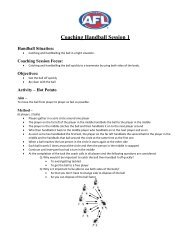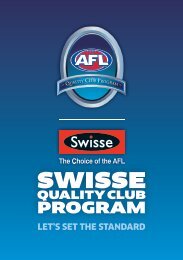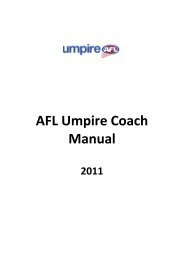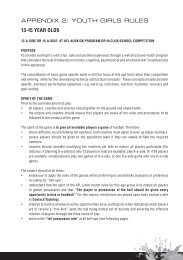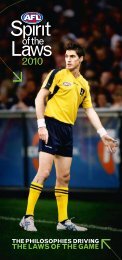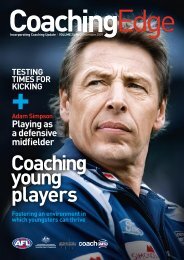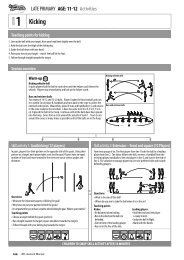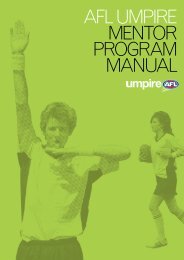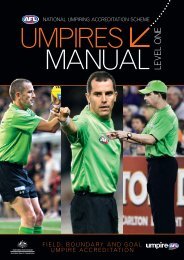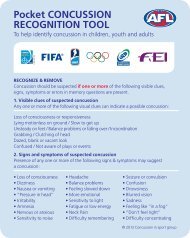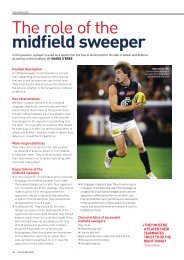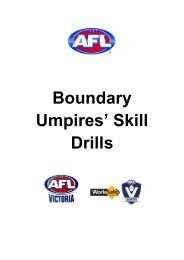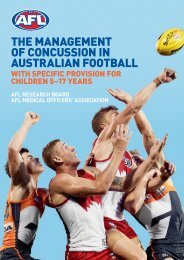Coaching Edge - AFL Community
Coaching Edge - AFL Community
Coaching Edge - AFL Community
You also want an ePaper? Increase the reach of your titles
YUMPU automatically turns print PDFs into web optimized ePapers that Google loves.
“With the forward press mentality of<br />
teams, they know the easiest place to press is<br />
once you get it deep in your forward line, the<br />
narrowest part of the ground,” Teague said.<br />
“So, if you can get it in there quickly and if<br />
you can get players in there who can put that<br />
pressure on, the quick forwards, they give the<br />
rest of the team time to get down and get that<br />
forward press going.”<br />
Richardson said teams such as the Sydney<br />
Swans and St Kilda had started to do this with<br />
forward lines built around three or four quick<br />
small forwards.<br />
“They (the Swans) used those really good,<br />
hard runners to play that up-and-back,<br />
up-and-back type of footy,” he said.<br />
“That way they were able to clog up the<br />
opposition and then make it a foot race,<br />
obviously with guys like Lewis Jetta going<br />
back the other way.<br />
“We played St Kilda in round one of the NAB<br />
Cup and the speed they have in the front half<br />
with players like Ahmed Saad was a real concern<br />
for us, and I think it will be for many teams.<br />
“They get the ball over the back and let the<br />
little blokes run on to it.”<br />
Richardson said teams might look to counter<br />
this tactic by stationing a “wicketkeeper” deep in<br />
defensive 50 to guard open space.<br />
North Melbourne senior assistant coach<br />
Darren Crocker said more teams had been<br />
prepared recently to kick long to tall targets<br />
and get numbers to the fall of the ball.<br />
Teague, Richardson and Crocker agreed<br />
teams would have to strike a forward line<br />
balance between having marking targets<br />
they could kick to under pressure and players<br />
capable of applying pressure when the ball<br />
hit the ground.<br />
West Coast regularly fielded one of the<br />
tallest forward lines in the competition last<br />
year, playing two of Jack Darling, Quinten<br />
Lynch and Josh Kennedy, alongside a resting<br />
ruckman, Dean Cox or Nic Naitanui.<br />
The Eagles had considerable success with<br />
the tall structure, as did North Melbourne in<br />
the second half of the season with an attack<br />
centred around key forwards Drew Petrie,<br />
Lachlan Hansen and Robbie Tarrant.<br />
But Teague said teams looking to go tall<br />
in attack had to have players capable of<br />
applying defensive pressure as well.<br />
Teague cited the Swans as an example,<br />
saying they had often stacked their forward<br />
line last year with Lewis Roberts-Thomson,<br />
Adam Goodes, Sam Reid and one of their<br />
ruckmen, Mike Pyke or Shane Mumford,<br />
but were still one of the competition’s best<br />
exponents of forward pressure.<br />
“They had some really tall players but<br />
still had the ability to get that pressure<br />
on; ‘LRT’ (Roberts-Thomson) and Goodes in<br />
particular are very mobile,” Teague said.<br />
“So, I think each club will look at their list<br />
and see what best suits them.<br />
“No doubt they’ll want the tall targets<br />
if it’s a pressurised game and you’ve got<br />
to kick to a contest.<br />
“But you want the ability that once it hits<br />
the ground, you can keep it in there as long<br />
as possible.”<br />
As for defensive strategies teams might<br />
employ this season, Richardson said few<br />
teams had played a seventh defender or<br />
loose man in defence last season, but he<br />
had noticed several teams employing it<br />
in the NAB Cup.<br />
Last year, you saw<br />
‘<br />
key midfielders<br />
like Josh Kennedy<br />
and Jobe Watson<br />
playing out of<br />
the goalsquare<br />
at times, as<br />
opposed to<br />
having them<br />
come off<br />
the ground<br />
’<br />
Alan Richardson<br />
“Initially that player is<br />
there to support the<br />
defence, but they very<br />
quickly get involved<br />
in offence when the<br />
opportunity presents,”<br />
Richardson said.<br />
Crocker said teams<br />
might decide to play a loose<br />
man in defence late in games when fatigue<br />
meant they struggled to maintain their<br />
defensive set-ups.<br />
“That way, if the opposition does get through<br />
your set-ups up the ground, you’ve got that<br />
spare defender out the back as a last line of<br />
defence who can come up and defend,” he said.<br />
Richardson said teams would also ask their<br />
players to be more versatile this season, with<br />
a view to resting less often on the interchange<br />
bench and more often in a different position.<br />
“In terms of rotations, teams are definitely<br />
talking to their players and you can see by<br />
the positions and the number of positions<br />
that players are playing in any one game<br />
that they’re going to need to be versatile,”<br />
Richardson said.<br />
“Last year, you saw key midfielders like Josh<br />
Kennedy and Jobe Watson playing out of the<br />
goalsquare at times, as opposed to having<br />
them come off the ground.<br />
“And that was when we had unlimited<br />
rotations. In the NAB Cup games that had caps<br />
on rotations, you certainly saw players stay on<br />
the ground and change positions.<br />
“Even in the home and away season –<br />
especially next season when the interchange<br />
cap comes in – you’re not going to<br />
be able to play extended time<br />
in the midfield.<br />
“But that doesn’t<br />
mean you’ll come off the<br />
ground. Most often these<br />
midfielders will have to<br />
go forward.”<br />
This article appeared<br />
in the round one<br />
edition of the<br />
<strong>AFL</strong> Record.<br />
VERSATILE:<br />
Jobe Watson<br />
can push<br />
forward and<br />
play out of the<br />
goalsquare.



